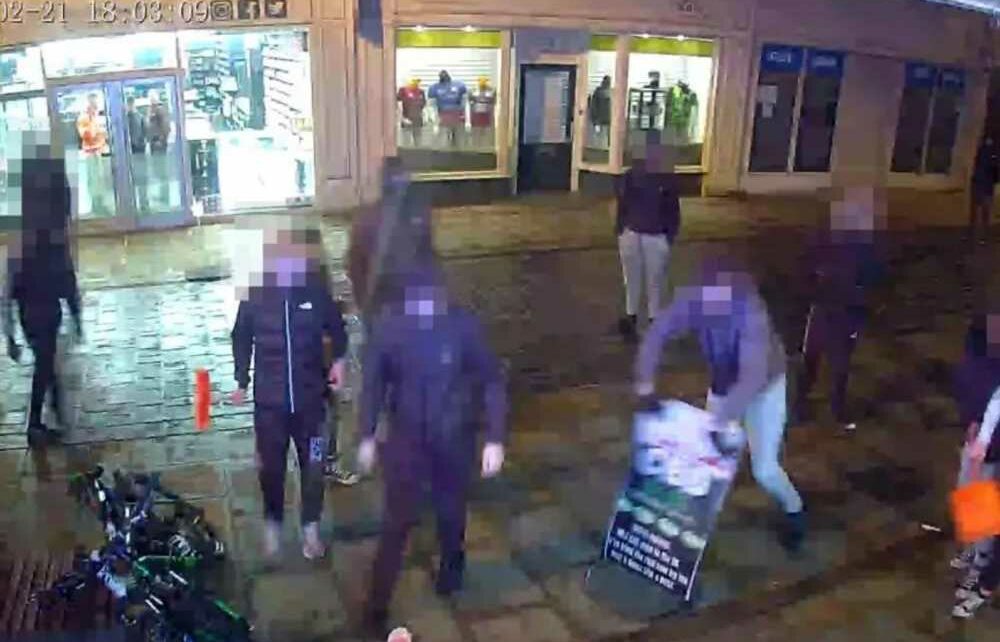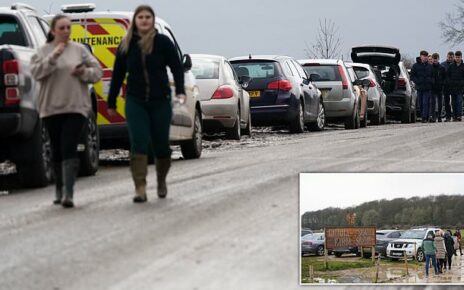THE department store windows are covered in peeling paper and rows of shops lie empty and abandoned.
Marks & Spencer has been turned into a Job Centre and even the Mecca bingo hall has locked its doors for good.
In one of Hull’s once bustling city centre streets, an astonishing 16 store units are empty.
Fading ‘To let’ signs are scattered along the fronts, a stark reminder of the fate of so many businesses and jobs.
Just last week Argos confirmed it was pulling out of the city centre, the latest high-profile name to leave for good.
This is the grim reality of the collapse of the high street in the North of England, laid bare in official statistics from the British Retail Consortium which showed a fifth of shops stand empty in the North compared to one in 10 in the South.
READ MORE IN FEATURES
Second homes are turning our once-affordable seaside town into London-on-Sea
Our area has gone so downhill it’s now a ghost town with ruined buildings
Thousands of shops are shuttered, and with them countless jobs and livelihoods are lost, as town and city centres become retail wastelands buckling under the cost of living crisis and competition from online shopping and out-of-town retail parks.
'It's just depressing'
In Hull, one of the worst cities affected where one in four shops are shut, the lost department stores have been replaced by a surge in vape shops, bargain stores, exchange markets and charity shops.
Residents say the proud city – which was ravaged by Luftwaffe bombs during World War Two – faces an existential threat to its high street driven by online shopping and violent yobs.
Georgia Smith, 24, who is looking for clothes for her boyfriend, says she only ventures into the city centre a couple of times a month, despite living just 10 minutes from the city-centre.
Most read in The Sun
Comedian Bobby Davro's fiancée Vicky Wright dies after cancer battle
Taylor Swift posed with new lover Matty Healy's mum Denise Welch MONTHS ago
Taylor Swift dating Matty Healy weeks after split from boyfriend Joe Alwyn
Huge 90s popstar announces heartbreaking split from husband of 10 years
“There’s just nothing here for me any more,” she says. "I used to like Debenhams, Topshop and Zara but they’ve all gone. It’s just depressing. I mainly shop online now or go to York which is much nicer.”
In an area close to Hull’s main railway station, the landmark House of Fraser closed in 2019.
In its place an ambitious high-end food hall serving pricey pizzas and expensive real ales opened – just as the economy started to slide. It struggled to attract customers and closed in March after just over a year.
Close by, a homeless man has turned the entrance to one empty shop into a makeshift home. He lies sleeping as shoppers pass by, with his meagre possessions by his side.
Nearby is the abandoned Debenhams, a former firm favourite for a generation of shoppers. It closed in May 2021 and still lies boarded up and empty. A host of other names have long gone, like Zara, Top Shop, New Look and Burton.
Across the road, the huge Mecca Bingo hall closed in February, blaming the cost of living and a struggle to attract customers into the city centre.
Not safe
Retired Sheila Milner and husband Glen, both 63, are walking to their bank. It’s a trip they now make only once a fortnight.
“It’s like a ghost town now. We would rather get the train to York to do shopping," says Sheila. "All the big department stores have gone, Debenhams, House of Fraser, C&A and BHS. There’s no reason for us to come in.”
Hospital porter Glen adds: “It used to be so busy you could hardly get down the street. But everything has changed. I don’t shop online but there’s nothing here for me.”
As we speak to Sheila and Glen Milner on Whitefriargate a gang of youths in baseball caps and hoodies cycle past, shouting abuse.
The problem of gangs of youngsters descending on the city centre has become a major issue in Hull.
Crowds of spice users and drunks gathered near the old BHS until recently, when Humberside Police placed a prominent ‘pod’ police station in the centre of town.
That has now gone, but violence and vandalism remain. On the night of March 24, Kamil Milczarczky was stabbed to death on Princes Dock Street, a cobbled road near Whitefriargate and Princes Quay shopping centre lined with popular bars and cafes.
Police have charged 13 teenage boys and young men, aged 16-22, with the alleged murder. Kamil's family described him as a compassionate, loving young man who "only saw the best in people".
Last August, a few yards away, a Deliveroo cyclist was set on by a gang of youngsters in broad daylight. The horrifying attack was caught on bodycam footage.
And six months earlier Hull Live published CCTV footage of a gang of young people laying siege to a Pound Bargains shop on Whitefriargate, abusing staff and attacking them with a table.
Georgia said she had been in town on the night of Kamil’s death and she and her friends had vowed not to return as a result. They travel to the nearby upmarket town of Beverley instead for nights out.
“It was just so shocking to know that had happened in the city centre when people are just out trying to enjoy themselves,” she said.
“But there is so much trouble now we don’t go out in Hull at night. We go to Beverley. It’s safer. I just don’t feel safe as a woman out in Hull.”
Recovery signs
In Whitefriargate, the ground zero of Hull’s retail collapse, the city’s only Marks and Spencer is now a Job Centre after closing in 2019.
Along the entire length of one side of the pedestrianised street, long ago the beating heart of the city’s shopping trade, just a handful of shops survive. Around 16 units are closed.
But there are some signs of recovery. Small independents have sprung up in smaller stores backed by local property developers or benevolent landlords.
Student Dan Kelsey, 19, is more optimistic than some. He thinks independent shops can replace brand names.
“There are bits that are untidy and need clearing up but I think there are good reasons to come in,” he says.
“It’s getting better, coming together. I’m a musician so I’d like to see more music related places, geared more towards young people.”
Friend and fellow student Gabi Johnson, 20, travels to Hull for college but does most of her shopping online. She said: “It’s sad seeing all the empty shops. It would be nice to see more cafes and smaller independent shops.”
It’s a theme shared by many including local shop owner Mark Harris, 59. Mark has run the Brookes Menswear store in the city centre for 21 years and the business has been open for more than 40.
He says he manages where bigger brands have failed because of loyalty, trust and friendly service.
He said: “The big stores have all gone so the whole demographic has changed. I don’t think footfall is down massively but we have longevity. It’s about reputation and trust for us. You can’t get that online.”
Mark thinks the big city centre shopping centres will continue to struggle and expects more closures from brand names. But he is enthusiastic about a huge development nearby being led by Hull City Council.
The £96m Albion Square complex of apartments, offices and some retail units should encourage more people to live in the city centre and use local businesses.
Mark says: “When that goes up, maybe in two or three years, that will have a positive impact.”
'Hullywood' movies
Local tour guide Paul Schofield, 61, also remains positive about the future – but not through a return to big shopping brands.
He said: “I don’t see the changes as a problem but an opportunity. I like the influx of independent shops. It changes the character of the city centre and that is a good thing.
"The key for me is changing to a leisure economy, getting visitors in to visit museums, galleries, concerts and gigs. Visitors are used to empty shops, what they want is attractions, not big shops.”
Down at the city’s former Fruit Market area, once part of the city’s once-thriving docks, hip bars and small independent shops survive and some thrive.
Hull has also become a popular destination for movie makers, attracted by easy access and stunning old buildings in the Old Town which survived the Luftwaffe bombs which wiped out much of central Hull in the Second World War.
Netflix hits like Enola Holmes and The Crown, The Extraordinary Life of David Copperfield and A Royal Night Out have been filmed here, giving the city the nickname "Hullywood".
But the figures remain grim. Property experts Knight Frank said in 2022 Hull’s retail economy was officially “distressed” with more than one in four shops vacant.
A Hull City Council report said 27 per cent of retail units were vacant, compared to an average of 16 per cent nationwide.
And the British Retail Consortium said in a report last week that a deepening divide is emerging between the prosperous south and the rest of the country.
The highest number of vacant stores were in the North East (17.5 per cent), Wales (16.5 per cent) and the West Midlands (15.8 per cent). By contrast, the lowest vacancy rates are in London (11.1 per cent), the South East (11.3 per cent) and the East (12.8 per cent).
A spokesman for Hull City Council said: “We care about making Hull a better place to live, work and invest and to help achieve this, we work constantly to ensure there are as few empty units in Hull city centre as possible.
“This is through sourcing investment and working in partnership with building owners and developers, as well as providing funding through schemes such as Levelling Up Fund, Humber High Street Challenge Fund and High Street Heritage Action Zone.
Read More on The Sun
Shoppers are going wild for M&S midi dress that’s ideal for the Coronation
Here’s why you must NEVER pee in the shower – and 4 other habits to avoid
“The Fruit Market area is a great example of this success, receiving national recognition, and has welcomed numerous new retail and hospitality businesses, creating over 1,000 city centre jobs, together with developing wonderful new homes.
“The council secured £19.5million from the Government’s Levelling Up Fund early last year, £7million of which is being allocated for major city projects which will not only create further office and retail space, but also much-needed, high-quality city centre living too.”
Source: Read Full Article

























